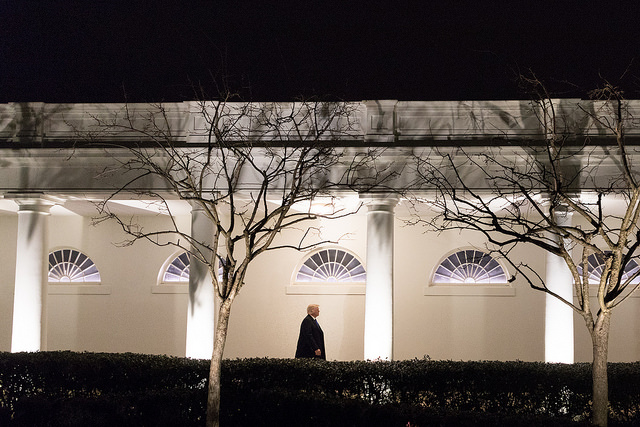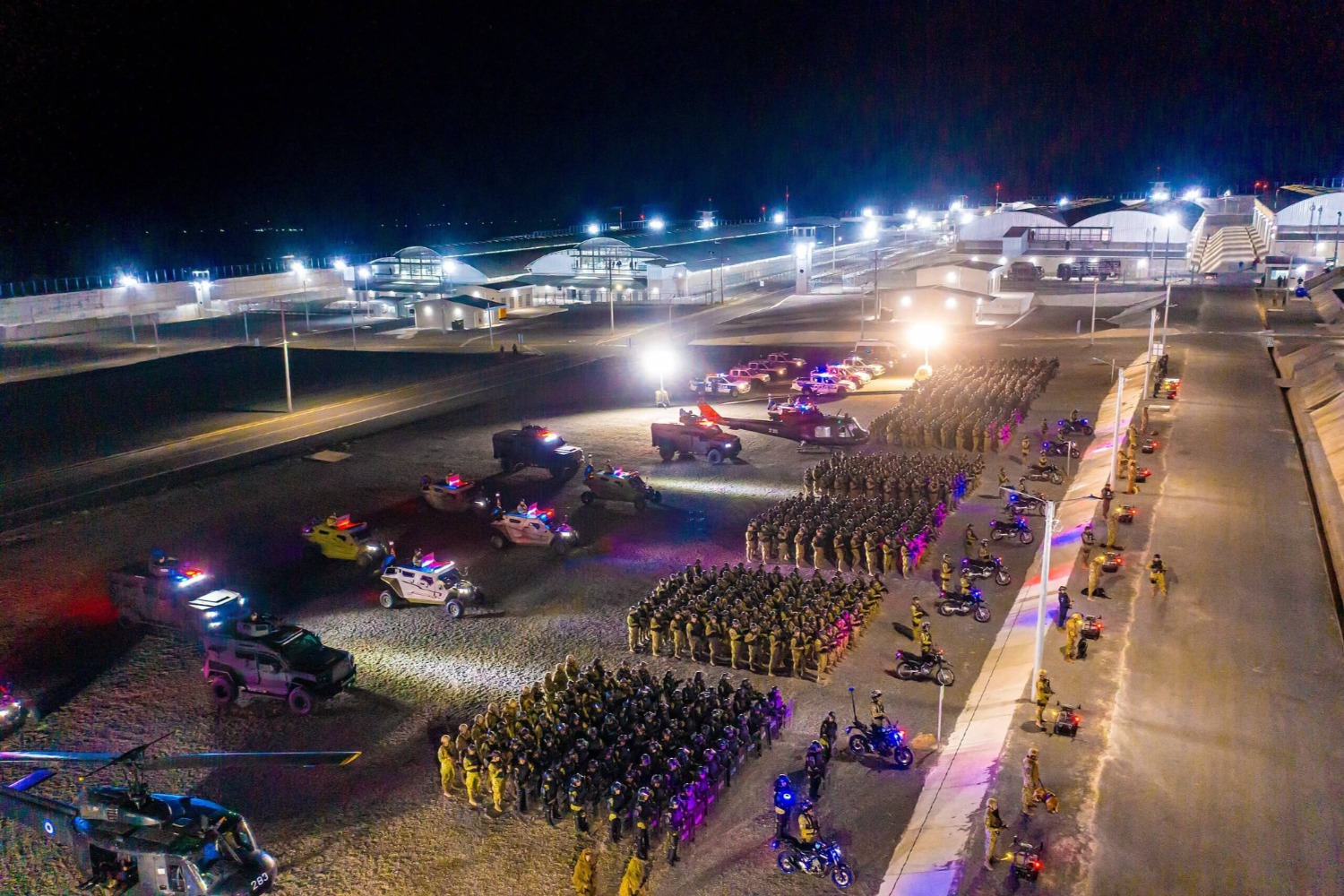How the Cohen Raids and Trump’s Reactions Edge Us Toward Confrontation
The country is entering a dangerous moment—the moment of actual confrontation between the president of the United States and those who would investigate him.

Published by The Lawfare Institute
in Cooperation With

The country is entering a dangerous moment—the moment of actual confrontation between the president of the United States and those who would investigate him.
This moment has been deferred for months through a combination of strategies. The president’s lawyers convinced their client for a spell that the investigation would wrap up and clear him if he just cooperated. Investigators refrained from antagonizing the president; they did not leak disparaging material about him or those close to him. They framed their indictments narrowly so as not to suggest more than they were immediately prepared to allege. Even as they moved forward, investigators left room for the president and his defenders to put off any showdown.
The result was that, for months, a confrontation has loomed over American political culture, but has ripened slowly and, while in plain view, in a fashion that has permitted people to avert their gaze. Those who wanted to deny that the confrontation was coming at all could convince themselves that perhaps Special Counsel Robert Mueller’s investigation would peter out; perhaps it would reveal only misconduct by expendable hangers-on in the president’s entourage; perhaps it would reveal only politically embarrassing conduct rather than conduct that required elements within the executive branch to lock horns over whether the special counsel would be meaningfully permitted to accuse the president.
On Monday, however, the space for such denial began to shrink markedly—and the time span for deferral of the confrontation has shrunk as well.
I will put this as bluntly as I know how: There is no way that the U.S. Attorney’s Office for the Southern District of New York would have sought or executed a search warrant against the president’s lawyer without overpowering evidence to support the action. The legal standard for such a search requires only probable cause that criminal activity is taking place. Under normal circumstances, which these are not, the prudential and policy factors counseling against such an action would be powerful.
For starters, the Justice Department is institutionally cautious about searches involving attorneys acting in their role as attorneys. As Paul Rosenzweig noted, “the U.S. Attorney’s Manual has an entire section that limits how and when the offices of an attorney may be searched. Realizing full well that such searches are in derogation of the value of the [attorney-client] privilege, the manual requires high-level approvals, the exhaustion of other investigative avenues, and specifies procedures that are to be followed to limit the intrusion on privileged documents.” Moreover, the Justice Department would have been additionally cautious about seeking any warrant against this particular lawyer—precisely because doing so makes clear that a ring is closing around the president. Going after a prominent person’s lawyer for matters related to his representation of the client is, after all, an aggressive act toward the client, not just toward the lawyer. And Trump is, as he puts it, a counterpuncher.
This is the kind of step that would predictably elicit a reaction. The Justice Department simply would not take such an action lightly or without evidence that emphatically supports it. Add these prudential, legal and policy factors together and they cumulatively suggest that the evidence supporting the warrant application likely exceeds—probably by far—what is legally required.
Put another way, Cohen’s situation, and thus Trump’s situation, is grave.
This seriousness is not simply a function of the apparently advanced state of some of the evidence involved. The nature of the warrant shows that the investigation itself is spreading. According to the New York Times, “The F.B.I. agents who raided the office of President Trump’s personal lawyer on Monday were looking for records about payments to two women who claim they had affairs with Mr. Trump, and information related to the publisher of The National Enquirer’s role in silencing one of the women, several people briefed on the investigation said.”
In short, this search warrant is apparently not about L’Affaire Russe. The FBI raided the office of the president’s personal lawyer on a matter related to L’Affaire Stormy. That means that prosecutors were able to show probable cause of criminal activity connected to Cohen’s representation of the president on matters far removed from Russian interference in the 2016 campaign, obstruction of justice or any of the other matters within Mueller’s purview. Notably, this subject matter metastasis coincides with a bureaucratic metastasis as well. It was not, after all, Mueller who sought or received the warrant. As Rosenzweig notes:
Muller referred the matter to the Justice Department, where the investigation was assigned to the U.S. Attorney’s Office for the Southern District of New York. That office (run by a Trump appointee) then procured the warrant—with the approval of a magistrate judge—and worked with the FBI to conduct the search. In this regard, the special counsel’s actions, and the Justice Department referral are completely unlike the Starr investigation on which I worked many years ago. There, Attorney General Janet Reno kept expanding the Starr investigation into new areas—mostly, I think, as a matter of convenience. Here, the department seems intent on cabining the Mueller investigation to the scope it was originally initiated for—and to also be willing to spin off unrelated matters to the relevant local U.S. attorney’s office.
This bureaucratic distribution of the investigation is actually a good thing. It will have the effect of diffusing responsibility for the investigations as they develop away from Mueller. One of the problems with Reno’s decision to concentrate so many investigative matters in Starr’s hands was that Starr became the locus of all things related to investigations of Bill Clinton. This proved damaging to Starr’s credibility, as people were able to accuse him of being on a far-flung series of vendettas against Clinton. He was also accused of mission creep, and there was some truth to that charge. But Starr also suffered from the repeated assignments of unrelated matters to his office by Reno and the Justice Department.
Rosenstein, who worked for Starr, does not appear to be making the error of concentrating things in Mueller’s hands. Bloomberg reports that Rosenstein made the decision to refer the Cohen raid to the Southern District of New York, rather than keeping it within Mueller’s exclusive purview. Likewise, the Times reports that Rosenstein “personally signed off on Monday’s F.B.I. decision to raid the office of Mr. Cohen.” Rosenstein, in other words, chose to spread responsibility around, taking some of the heat of the president’s wrath off of Mueller. This was the right move. But it also carried risks—specifically, the danger of making Rosenstein himself so central to the investigations that he becomes a target of the president’s ire. The metastasis may protect Mueller, but it also may endanger Rosenstein.
Trump clearly understands the gravity of the situation. He went on an extended rant Monday in which he openly contemplated the firing of Mueller, railed against Rosenstein and complained yet again about the decision by Attorney General Jeff Sessions to recuse himself from the Russia investigation. From the White House transcript:
It’s, frankly, a real disgrace. It’s an attack on our country, in a true sense. It’s an attack on what we all stand for.
...
[T]his is the most conflicted group of people I’ve ever seen. The Attorney General made a terrible mistake when he did this, and when he recused himself. Or he should have certainly let us know if he was going to recuse himself, and we would have used a — put a different Attorney General in. So he made what I consider to be a very terrible mistake for the country. But you’ll figure that out.
Q: Why don’t you just fire Mueller?
THE PRESIDENT: Why don’t I just fire Mueller?
Q: Yeah, just fire the guy.
...
Well, I think it’s a disgrace what’s going on. We’ll see what happens. But I think it’s really a sad situation when you look at what happened. And many people have said, “You should fire him.” Again, they found nothing. And in finding nothing, that’s a big statement. If you know the person who’s in charge of the investigation, you know about that. Deputy Rosenstein — Rod Rosenstein — he wrote the letter, very critical, of Comey.
...
But he signed — as you know, he also signed the FISA warrant. So Rod Rosenstein, who’s in charge of this, signed a FISA warrant, and he also signed a letter that was essentially saying to fire James Comey. And he was right about that. He was absolutely right.
Trump has contemplated Mueller’s dismissal before; he reportedly ordered it once, in June 2017, and demanded it again in December, albeit unsuccessfully. And he has certainly complained before about Mueller’s supposed “conflicts” and the Justice Department’s failure to investigate Hillary Clinton for her many infamies.
There was, however, something different about his performance Monday—and the difference involves both the ferocity of his comments and their timing. Prosecutors—not Mueller himself, but the Justice Department in response to information unearthed by Mueller—took an action that the president (correctly) perceived as threatening to him, and the president responded by threatening to remove Mueller from office and by once again menacing Rosenstein. CNN reported Tuesday that Rosenstein’s job may be in danger.
The risk to Mueller and Rosenstein is not new. It’s been obvious for a long time that Trump could wake up any day and decide to fire either or both of them. But the combination of the mounting investigative pressure on the president and his open contemplation of their dismissal makes the concern more acute. If the confrontation is upon us, or if it has grown imminent, the immediate question is whether the president will be content to let the investigation take its course—or whether he will use the powers of his office to frustrate it. And if he chooses the latter course, will our political system endeavor to stop him? While some congressional Republicans have pushed back against the president’s latest threats—Sen. Chuck Grassley declared that dismissing Mueller would be “suicide,” and Sen. Thom Tillis has reportedly begun lobbying the Senate Judiciary Committee to take up his legislation protecting the special counsel—others responded with little more than shrugs.
To make the whole picture more unsettling, the confrontation is brewing against a backdrop of increasing policy instability. National security officials are dropping like flies. The most recent casualty is Tom Bossert, the president’s counterterrorism and homeland security adviser, who was removed Tuesday morning in an apparent power play by incoming national security adviser John Bolton. Bossert has been a loyal servant of the president. He was also an establishment figure whose substantive views on national security matters are refreshingly conventional. His removal comes as the administration contemplates how to respond to the latest chemical weapons attack in Syria, and it extends the pattern of staff disruption that has left the administration shorthanded when dealing with the sort of major issues that arise in a world that isn’t getting less dangerous. In other words, in the past 24 hours the White House has not merely taken a few steps closer to a major confrontation with the Justice Department and the special counsel but has also made sure that the government is badly positioned to handle security crises that may erupt in tandem with that confrontation.
I’m not one to spend time psychoanalyzing Donald Trump. I don’t know whether he’s going to fire Mueller, Rosenstein, both or neither, and I also don’t know the pace at which the investigations will move. But the country has moved closer to confrontation—and the belief, particularly on the president’s part, that the confrontation is coming may well help to precipitate it.



.jpeg?sfvrsn=ad4bd1de_5)

